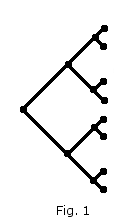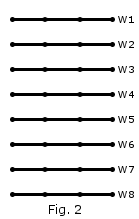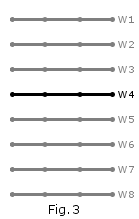There is a theory of knowledge called Middle Knowledge that has been used to combat Determinism. It is used because Determinism, in a way, makes God culpable for sin – for if God caused everything then he caused you to sin. Middle Knowledge steers away from this by affirming libertarian free-will. The theory is such that God knows all factuals (those things that will happen) and all counter-factuals (those things that will not happen but could have happened).
Determinists believe that God was the “First Cause.” Everything comes to its end through a cause-effect relationship, He was the First Cause, and so everything through extension was caused by God. Yielding this problem: If God causes the First Cause, knowing the outcome, then by extension he caused (or determined) you and me to sin. Hence, the theory of Middle Knowledge – those who affirm Middle Knowledge (as the solution) hold to libertarian free-will. I qualify the previous statement with “as the solution” because I feel that a determinist can hold to Middle Knowledge, simply because they believe that God can know “counter-factuals.” Anyways, Libertarian free-will is the belief that moral man has the freedom to make moral choices. For instance, I encounter problem A, with two choices, X or Y. X would be a sin, Y would not. Because it is I who chooses, God is no longer responsible for my sin. A determinist would believe that if I were to encounter problem A, with two choices, X or Y, then I would pick the one that had been determined for me to pick – so basically I only have the “appearance” of choice, but in reality I would have never picked one over the other (for that specific event, in time and space).
However, Middle Knowledge does not actually solve the problem caused by Determinism. You see, God knows every choice that could ever possibly happen. This leads to “possible worlds” (or possible universes). So there are possible worlds where I did not write this blog and there are possible worlds where I did write this blog. That is not to say that there are alternative universes, but just “possible” worlds that God could have actualized. As the theory goes, knowing all of the counter-factuals (i.e. possible choices) God actualized the one world (the best world) that best suited his will. So He actualized the world where I did write this blog (not any of the others that God knew could happen).



For the sake of simplification, let me try to illustrate what I mean. Let us say there are eight possible worlds that God can logically choose from (fig. 1). For the sake of argument we will say that there are only two possible choices one could make. At the first choice you could go either left or right, the second choice either left or right, and so on and so forth. Let us say that we stop at the third possible choice, giving us eight possible worlds. God will only actualize one of these eight, W1-W8 (symbolized by the red markings).
Now, let me place each of these possible worlds on their own timeline (fig. 2). As you can see, with this simplified illustration, there are eight possible choices of worlds that God can actualize. For the sake of the argument, let us say that each of these choices are all logically possible. Based on what we know about God (from scripture), He will most likely only actualize the world that best suits His will. Let us say that He decides that W4 would be the best possible world for him to create (fig. 3).
Here is where the problem becomes more visible. As you can see, God still determines the outcome, only this time He used Middle Knowledge to help Him. Because He decided that W4 is the best world for him to create, he also knows that in W4 we are going to sin. Yet he still actualizes this world. From the beginning to the end, everything must be determined – it cannot be changed. Everything still comes to its end through a cause-effect relationship, He still is the First Cause, and so everything through extension was caused by God.
Now, I do hold to the deterministic position. I do not like how it makes God culpable for sin, but I am not sure that it actually does make Him culpable/responsible for sin. I also affirm Middle Knowledge, not as a solution to the problem, but because I cannot imagine that an Infinite God cannot know everything that “might have” happened had He created a different world. Also, considering that we as finite beings are able to posit what may or may not happen given a certain set of events, how much more should God be able to do the same? The only difference is God knows what will happen, especially because He built it to happen that way.
From what I know and understand of logic, cause-effect relationships, and the sovereignty of God I cannot hold to Middle Knowledge as the solution. However, I am not totally sold on determinism because of the problem it causes. I think there needs to be much more discussion on the issue. Either we should figure out how determinism can exist without the problem or we need to come up with another position that does not inevitably reach determinism by another name.
What do you think?